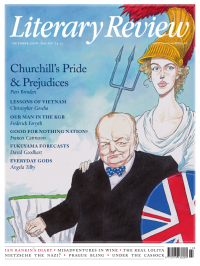Simon Blackburn
Taking a Bearing
How the World Thinks: A Global History of Philosophy
By Julian Baggini
Granta Books 398pp £20
Insularity is a professional vice among academic philosophers. It is not so much that the British read British philosophers (and some ancient Greeks), the Germans read German philosophers (and some ancient Greeks), and so on across the world. It is rather that we become trapped in little bubbles of problems and approaches, and find it difficult to recognise alternatives as the real thing: philosophy as well as something else, such as literature or religion. The habitat we have settled into provides enough interest and nourishment, and it is rather daunting to imagine any other. Some of us, feeling a little guilty about this, suppose that one day, when we are less busy, we might travel, just as someone newly retired supposes that he or she might eventually take a cruise, perhaps to India, China or Japan. But often enough, we do not manage to turn the wish into the deed. And if we do, we often find ourselves to be mere tourists, gaping at the surfaces of things, unable to comprehend the life underneath them.
Julian Baggini, a prolific and engaging philosophical writer, is made of sterner stuff, and this fascinating book is the result. He has not only undertaken to acquaint himself with different traditions of thought, but has also travelled to different countries and institutions, attended multicultural conferences and workshops, and interviewed representatives of different traditions. He has done so in the spirit of a genuine traveller rather than a tourist, and the results are always intriguing and often illuminating.
He is, of course, aware that the undertaking is fraught with problems. At the beginning of such a quest, we can only hear the words of other traditions through translation into our own. The question of what is real understanding and what is an imposition of the concepts and

Sign Up to our newsletter
Receive free articles, highlights from the archive, news, details of prizes, and much more.@Lit_Review
Follow Literary Review on Twitter
Twitter Feed
It wasn’t until 1825 that Pepys’s diary became available for the first time. How it was eventually decrypted and published is a story of subterfuge and duplicity.
Kate Loveman tells the tale.
Kate Loveman - Publishing Pepys
Kate Loveman: Publishing Pepys
literaryreview.co.uk
Arthur Christopher Benson was a pillar of the Edwardian establishment. He was supremely well connected. As his newly published diaries reveal, he was also riotously indiscreet.
Piers Brendon compares Benson’s journals to others from the 20th century.
Piers Brendon - Land of Dopes & Tories
Piers Brendon: Land of Dopes & Tories - The Benson Diaries: Selections from the Diary of Arthur Christopher Benson by Eamon Duffy & Ronald Hyam (edd)
literaryreview.co.uk
Of the siblings Gwen and Augustus John, it is Augustus who has commanded most attention from collectors and connoisseurs.
Was he really the finer artist, asks Tanya Harrod, or is it time Gwen emerged from her brother’s shadow?
Tanya Harrod - Cut from the Same Canvas
Tanya Harrod: Cut from the Same Canvas - Artists, Siblings, Visionaries: The Lives and Loves of Gwen and Augustus John by Judith Mackrell
literaryreview.co.uk